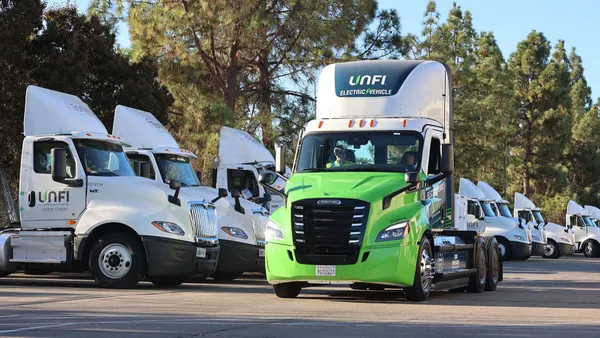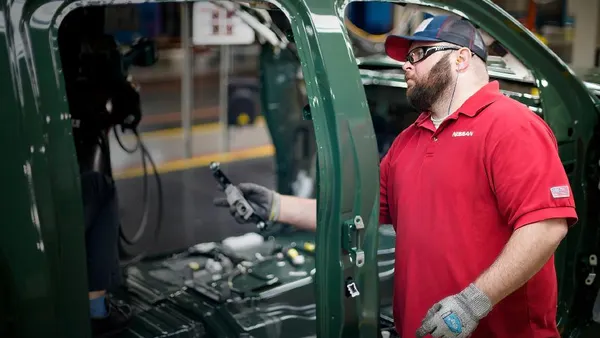Dive Brief:
- The risk of modern slavery in Asian manufacturing hubs has increased "significantly" over the last four years, and the pandemic has complicated the auditing process for corporate procurement, according to the Verisk Maplecroft Modern Slavery Index, which measures a business' risk with slavery, human trafficking and forced labor in supply chains, operations and service providers.
- Manufacturing hubs like Bangladesh (18th highest risk globally), China (20th), Myanmar (23rd), India (25th), Cambodia (32nd), Vietnam (35th) and Indonesia (44th) dropped to their lowest level on the index since 2017 and have either extreme or high risk of slavery cases. Slavery cases are most common in North Korea, Yemen, Syria, South Sudan, Iran, Somalia, Sudan, Congo, the Gambia and Burundi, according to the index.
- "Travel restrictions and other measures to reduce the spread of COVID-19 have left the ability of companies to carry out audits to ensure ethical working practices in their supply chains in disarray," Sofia Nazalya, a Human Rights Analyst at Verisk Maplecroft, said in a statement. "The reputational risk to brands from association with modern slavery is, therefore, now higher than at any other time over recent years."
Dive Insight:
As the pandemic and economic downturn caused a drop in consumer demand, many purchasing firms paused or delayed orders from manufacturing hubs in Asia. Lower production levels in factories translated into fewer employees needed, pushing many workers into the "informal economy."
"With more than 65% of Asia’s workforce employed in the informal economy with little or no access to labour protections, they will be increasingly exposed to the risk of forced labour," the Verisk Maplecroft report reads.
The report links the higher risk of slavery in Asian manufacturing hubs to increased frequency and severity of violations. The report did not define "violations," but in the past, the term has been used to refer to acts including trafficking and servitude.
Vietnam has seen the largest increase in violations among the Asian manufacturing hubs. Cambodia fell the furthest in the rankings as a result of weakening enforcement, which is also why China and India fell in the rankings. Bangladesh's violations increased, and enforcement weakened.
In Australia, the first deadline for companies to report under the 2018 Modern Slavery Act was extended by three months as a result of the pandemic, giving businesses more time to assess labor risks. The Australian government also issued guidance for businesses that need to comply with the law and have experienced disruption during the pandemic.
The U.K. government took a similar step.
"This signals that despite an understanding that companies will face certain challenges in meeting reporting requirements in this uncertain period, there are still expectations for them to respond to emerging modern slavery risks," Verisk Maplecroft wrote of countries issuing new guidance, specifically the U.K., Australia, Canada and Germany.
Procurement professionals have faced challenges assessing supply chain risks as COVID-19 travel restrictions prevented on-site supplier visits and audits.
"Canceling audits hinders a business’ visibility into its supply chain, negatively impacting its ability to uncover and respond to new issues," Sylvain Guyoton, senior vice president of research at EcoVadis, wrote in an opinion piece. Guyoton suggested virtual assessments as a "smart alternative."
The U.S. Bureau of International Labor Affairs provides grants to combat child labor, forced labor and human trafficking in global supply chains. It has noted plans to gather "information from our grantees about the impact of COVID-19 on vulnerable workers and their families."
A report by the United Nations Children's Fund and the International Labor Organization said the pandemic could result in millions of children being pushed into forced labor as unemployment rises and schools close.
"The last two decades have seen 94 million fewer children in child labour," the UN report notes. "This remarkable accomplishment is now under threat. The pandemic is likely to reverse progress and make the global target to end child labour harder to achieve."
In its guidance for companies, the Australian government said it is important to keep open communication with suppliers and pay for completed work to ensure they maintain cash flow. It also advised companies to avoid unreasonable changes to supplier contracts and to ask suppliers what they are doing to keep workers safe during the pandemic.
"The best thing buyers can do is to honor all the contracts," Jacob Clere, team leader of SMART Textile & Garments, a lobby group in Myanmar, said in a webinar earlier this year, according to the Ethical Trading Initiative.














